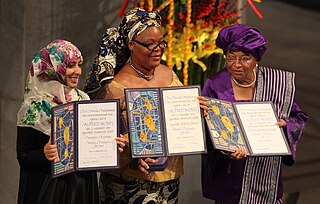
The Nobel Prizes are five separate prizes awarded to those who, during the preceding year, have conferred the greatest benefit to humankind, as established by the 1895 will of Swedish chemist, engineer, and industrialist Alfred Nobel, in the year before he died. Prizes were first awarded in 1901 by the Nobel Foundation. Nobel's will indicated that the awards should be granted in the fields of Physics, Chemistry, Physiology or Medicine, Literature, and Peace. A sixth prize for Economic Sciences, endowed by Sweden's central bank, Sveriges Riksbank, and first presented in 1969, is also frequently included, as it is also administered by the Nobel Foundation. The Nobel Prizes are widely regarded as the most prestigious awards available in their respective fields.

The Nobel Prize in Physics is an annual award given by the Royal Swedish Academy of Sciences for those who have made the most outstanding contributions to mankind in the field of physics. It is one of the five Nobel Prizes established by the will of Alfred Nobel in 1895 and awarded since 1901, the others being the Nobel Prize in Chemistry, Nobel Prize in Literature, Nobel Peace Prize, and Nobel Prize in Physiology or Medicine. Physics is traditionally the first award presented in the Nobel Prize ceremony.

Ralph Marvin Steinman was a Canadian physician and medical researcher at Rockefeller University, who in 1973 discovered and named dendritic cells while working as a postdoctoral fellow in the laboratory of Zanvil A. Cohn, also at Rockefeller University. Steinman was one of the recipients of the 2011 Nobel Prize in Physiology or Medicine.

The Nobel Prize in Chemistry is awarded annually by the Royal Swedish Academy of Sciences to scientists in the various fields of chemistry. It is one of the five Nobel Prizes established by the will of Alfred Nobel in 1895, awarded for outstanding contributions in chemistry, physics, literature, peace, and physiology or medicine. This award is administered by the Nobel Foundation, and awarded by the Royal Swedish Academy of Sciences on proposal of the Nobel Committee for Chemistry which consists of five members elected by the Academy. The award is presented in Stockholm at an annual ceremony on 10 December, the anniversary of Nobel's death.

The 2011 Nobel Peace Prize was jointly awarded to three female political activists. Two African and one Asian female were awarded for their persistence in obtaining equal rights for women.
The 2022 Nobel Prizes were awarded by the Nobel Foundation, based in Sweden. Six categories were awarded: Physics, Chemistry, Physiology or Medicine, Literature, Peace, and Economic Sciences. The winners in each category were announced from October 3 to October 10.
The 2021 Nobel Prizes were awarded by the Nobel Foundation, based in Sweden. Six categories were awarded: Physics, Chemistry, Physiology or Medicine, Literature, Peace, and Economic Sciences.
The 2015 Nobel Prizes were awarded by the Nobel Foundation, based in Sweden. Six categories were awarded: Physics, Chemistry, Physiology or Medicine, Literature, Peace, and Economic Sciences.
The 2013 Nobel Prizes were awarded by the Nobel Foundation, based in Sweden. Six categories were awarded: Physics, Chemistry, Physiology or Medicine, Literature, Peace, and Economic Sciences.
The 2012Nobel Prizes were awarded by the Nobel Foundation, based in Sweden. Six categories were awarded: Physics, Chemistry, Physiology or Medicine, Literature, Peace, and Economic Sciences.
The 2010 Nobel Prizes were awarded by the Nobel Foundation, based in Sweden. Six categories were awarded: Physics, Chemistry, Physiology or Medicine, Literature, Peace, and Economic Sciences.
The 2008Nobel Prizes were awarded by the Nobel Foundation, based in Sweden. Six categories were awarded: Physics, Chemistry, Physiology or Medicine, Literature, Peace, and Economic Sciences.
The 2005Nobel Prizes were awarded by the Nobel Foundation, based in Sweden. Six categories were awarded: Physics, Chemistry, Physiology or Medicine, Literature, Peace, and Economic Sciences. Typically announced in early October alongside the other prizes, the Literature Prize experienced a delay.
The 2004 Nobel Prizes were awarded by the Nobel Foundation, based in Sweden. Six categories were awarded: Physics, Chemistry, Physiology or Medicine, Literature, Peace, and Economic Sciences.
The 2001Nobel Prizes were awarded by the Nobel Foundation, based in Sweden. Six categories were awarded: Physics, Chemistry, Physiology or Medicine, Literature, Peace, and Economic Sciences.
The 2000 Nobel Prizes were awarded by the Nobel Foundation, based in Sweden. Six categories were awarded: Physics, Chemistry, Physiology or Medicine, Literature, Peace, and Economic Sciences.
The 1997 Nobel Prizes were awarded by the Nobel Foundation, based in Sweden. Six categories were awarded: Physics, Chemistry, Physiology or Medicine, Literature, Peace, and Economic Sciences.
The 1996 Nobel Prizes were awarded by the Nobel Foundation, based in Sweden. Six categories were awarded: Physics, Chemistry, Physiology or Medicine, Literature, Peace, and Economic Sciences.
The 1995 Nobel Prizes were awarded by the Nobel Foundation, based in Sweden. Six categories were awarded: Physics, Chemistry, Physiology or Medicine, Literature, Peace, and Economic Sciences.















